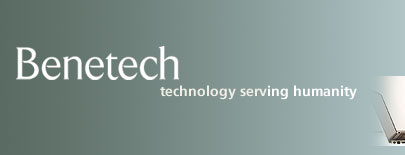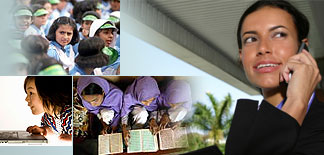
Build great companies, then help build a great world
![]() From
the San Jose Mercury News
From
the San Jose Mercury News
November 13, 2006
By Jim Fruchterman
Silicon Valley has become rich by selling our products around the world. We have a highly efficient system for creating technology that solves problems and delivers value far beyond the confines of Northern California. But, we have only scratched the surface of what we could be doing to help solve the pressing social problems that confront us.
Rather than focusing exclusively on the top 10 percent of humanity who are the target market for most tech products, we could be bringing these same skills, connections, technology, experience and resources to everyone in the world. Many of these opportunities are not as lucrative as the ones that business owners and technologists have focused on over the last decades, but they still demand our attention.
Charity? Philanthropy? Bleeding hearts? Perhaps, but when you use your heart, you don't have to check your brain at the door. The same skills and sophistication we use to build great companies can and must be applied to the world's biggest problems. One great way to explore how you can apply your business and technical skills is to link up with other like-minded people.
Silicon Valley entrepreneurs are building on the foundations laid by people like Bill Hewlett and David Packard, who long supported global issues and whose foundations continue their work today. We now realize that taking social action is in our direct interest and that of our children, whether it addresses human rights or the likely impacts of global warming. Human beings respond to incentives, and there are many opportunities to utilize more entrepreneurial approaches to maximize the social returns of investing in social enterprises.
The barriers are lower than you think. There are thousands of people here in Silicon Valley who have the resources to tackle a single global problem and make a dent in that problem on a global scale. The idea that Bill Gates could set out to ensure the vaccination of every child on the planet is completely feasible. What's your issue? Stopping domestic violence? Curing a specific disease? Increasing literacy for women? Using the same techniques we apply as business entrepreneurs, any number of us could tackle the problems of the world as social entrepreneurs.
Not all of us need to succeed to make this dream possible. The valley is famous for spawning many contenders in each new tech area, and only a few survive. Imagine a world where five different people take five different approaches to solving a crucial problem: Even if only two succeed, the world wins.
Use the same approach you would if you were trying to start a company. Understand the issue, and understand the people affected by the issue. Your potential customers may be most in need of certain technologies and the least able to afford it. Yet we know that poor people can be quite sophisticated and hardworking.
Muhammad Yunus, who won the 2006 Nobel Peace Prize as the founder of the Grameen Bank micro-loan program, made the point that poor people are poor because of lack of access to the tools they need to be successful such as accessible credit, which his bank was able to provide. We need to apply similar approaches when we develop and market solutions to people affected by social problems.
One example of this is the area of cognitive impairments. Bill Coleman, founder and chairman of BEA Systems of San Jose, and his wife Claudia, have backed the University of Colorado Coleman Institute for Cognitive Disabilities. The institute investigates innovative technologies to enhance the lives of people with cognitive disabilities, mental retardation and developmental disabilities. Opportunities to join or create these kinds of efforts abound.
The world wants to know that Silicon Valley (and America) really cares about them beyond extracting money for our businesses. I know that we care. Let's show them.
JIM FRUCHTERMAN is the CEO of Palo Alto-based Benetech, and a 2006 MacArthur fellow. He will be speaking at the Silicon Valley Challenge Summit: Sharing Technological Innovation for Global Benefit on Nov. 16. For more information, go to www.scu.edu/sts/Events/rios/.
Reprinted from MercuryNews.com.
- Back to Top -

